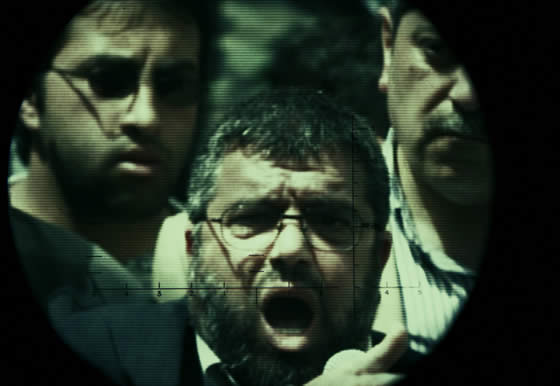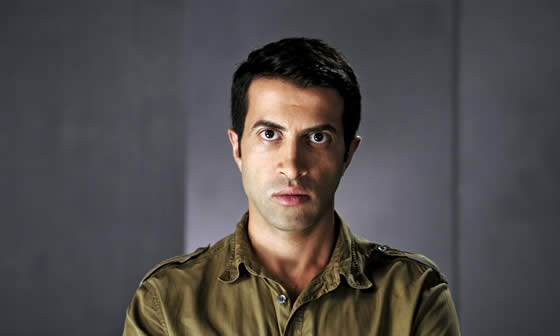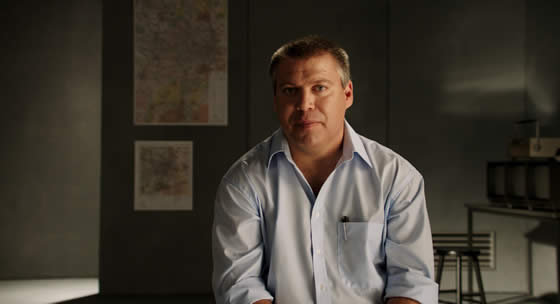 Based on Mosab Hassan Yousef’s bestselling memoir Son of Hamas, THE GREEN PRINCE exposes a complex world of terror, betrayal, and impossible choices. Through exclusive first-hand testimony, dramatic action sequences, and rare archival footage, decades of secrets come to light in this unflinching exploration of a profound spiritual transformation and the transcendent bonds of friendship. THE GREEN PRINCE directed by Nadav Schirman, will challenge much of what you know about the ongoing Israeli-Palestinian conflict.
Based on Mosab Hassan Yousef’s bestselling memoir Son of Hamas, THE GREEN PRINCE exposes a complex world of terror, betrayal, and impossible choices. Through exclusive first-hand testimony, dramatic action sequences, and rare archival footage, decades of secrets come to light in this unflinching exploration of a profound spiritual transformation and the transcendent bonds of friendship. THE GREEN PRINCE directed by Nadav Schirman, will challenge much of what you know about the ongoing Israeli-Palestinian conflict.
Bijan Tehrani: What originally motivated you to make “The Green Prince”?
Nadav Schirman: A friend of mine had alerted me to the book and I started reading the book and I couldn’t put it down. I read it in three hours and I was interested in the personal journey that characters go through but also the insiders perspective that writer was offering on Hamas. Being an Israeli, Hamas is our neighbors and we know nothing about them so the book was really eye opening in that sense. I was then introduced by one of our associates to Humin and when I understood the nature of the relationship between Moussab and Humin, my whole body was covered with Goosebumps because these were two enemies who through the process of working together had become better friends. After meeting with Moussab we moved forward with making the film and meeting him was an extraordinary encounter. When I met him the news had just came on the Osama Bin Laden had killing, and after five minutes of meeting him we were in a taxi heading to ground zero. It was fascinating to me that Moussab wanted to take part in this celebrating and we began this process of talking and establishing trust with one another and it took a lot of courage for both of them to open up and I think eventually they felt comfortable with the filmmaking process.
BT: There is an impressive human relationship between these two enemies who then become friends. Which had more value for you, the political story of the human story?
NS: Absolutely the latter, for us it was not a political story at all, in the first cut there were a lot more characters and we realized that the ultimate story here is the story of the relationship so we went back and restructured the film specifically around their relationship and the narrative arc is put specifically around this relationship.
BT: The film is not trying to justify anything and there is no judgment.
NS: Yesterday we had a screening and someone mentioned the same thing that there is a lack of judgment in the film and the way the two characters are framed, we were very careful with this because we did not want to pass any judgment. The nature of risk in the story was important to these two characters and they have to start thinking about the consequence in different and often time’s people will say that this film has given them a different perspective. I talked to a filmmaker called Jose Padilla, and he applied elements of the “Game Theory” to his documentary filmmaking, when you understand the rules of the game you understand what motivates each player an what motivates each move, and it is the same thing in “The Green Prince “and then you are not in a position to judge and you invest in their filmmaking process. Interestingly enough in the spy world it is called “The Game”.
 BT: I was speaking to an actress from the film at a screening, she was talking about some of the tactics of Hamas, and I don’t remember the film making a judgment about Hamas, but eventually we see both are eliminating human beings.
BT: I was speaking to an actress from the film at a screening, she was talking about some of the tactics of Hamas, and I don’t remember the film making a judgment about Hamas, but eventually we see both are eliminating human beings.
NS: Absolutely because you can see for both systems the human is not important, they are just tools and you see this, again the move is not just about Hamas and thimbet, so the events in the movie are only as important as the lives of the heroes of the film, so you must have detail about what happened to him when he was interrogated and what happened to him when he was in prison, so that is important to take into consideration and for a system there is no real value, so there is a lot of using of people and throwing them away but the human eventually prevail in this film. Humans are fragile and they are flawed but without humans the technological warfare cannot exist.
BT: How did you come up with the visual style of the film?
NS: We are story tellers so there is not that much of a difference between documentaries and narrative in that sense, we owe it to the people to tell their story honesty, and we have a responsibility to the audience as well, so we approached the whole project with a lot of responsibility to the characters and the audience. Real life stories are much bigger than fiction and this film could be more gripping than a Hollywood thriller?
BT: Any future projects lined up?
NS: Yes, there are a couple things in the making but there is a German saying which says “one should not speak about eggs which have not been hatched yet.”

